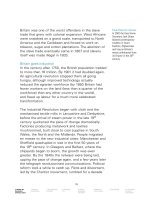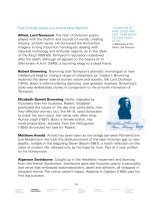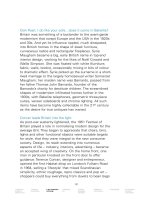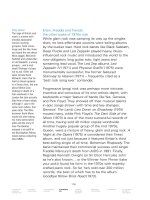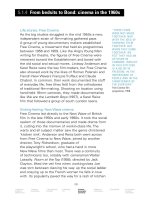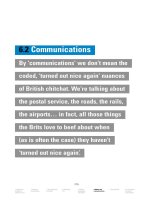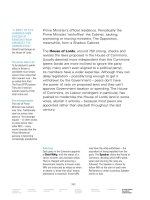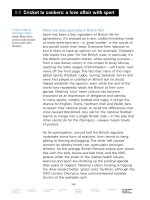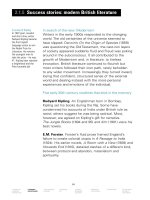Speak the culture britain be fluent in b 141
Bạn đang xem bản rút gọn của tài liệu. Xem và tải ngay bản đầy đủ của tài liệu tại đây (33.9 KB, 1 trang )
Ooh Pearl, I do like your sofa…does it come in Bakelite?
Britain was something of a bystander to the avant-garde
modernism that swept Europe and the USA in the 1920s
and 30s. And yet its influence rippled, much dissipated,
into British homes in the shape of sleek furniture,
curvaceous radios and rectangular fireplaces. Syrie
Maugham became a big, early British name in top-end
interior design, working for the likes of Noël Coward and
Wallis Simpson. She was fixated with white (furniture,
fabric, walls, books), occasionally mixing in bits of colour
to dramatic effect. Syrie picked up the surname in a shortlived marriage to the largely homosexual writer Somerset
Maugham; her maiden name was Barnardo, passed from
her father Thomas John Barnardo, founder of the
Barnardo’s charity for destitute children. The streamlined
shapes of modernism infiltrated homes further in the
1930s, with Bakelite telephones, geometric three-piece
suites, veneer sideboards and chrome lighting. All such
items have become highly collectable in the 21st century
as the desire for true antiques has waned.
Conran leads Britain into the light
As post-war austerity lightened, the 1951 Festival of
Britain played a role in normalising modern design for the
average Brit. They began to appreciate that chairs, bins,
lights and other functional objects were suitable targets
for style, that they were integral to the new consumer
society. Design, its reach extending into numerous
aspects of life – industry, interiors, advertising – became
an accepted wing of creativity. On the home front, one
man in particular knocked on the front door to offer
guidance. Terence Conran, designer and entrepreneur,
opened the first Habitat shop on London’s Fulham Road
in 1964, selling a ‘lifestyle’ that mixed Scandinavian
simplicity, ethnic roughage, repro classics and pop art –
shoppers could buy everything from duvets to bean bags
131
1. Identity: the
foundations
of British culture
2. Literature
and philosophy
3. Art, architecture
and design
4. Performing
arts
5. Cinema,
photography
and fashion
6. Media and
communications
7. Food and drink
8. Living culture:
the state of
modern Britain
